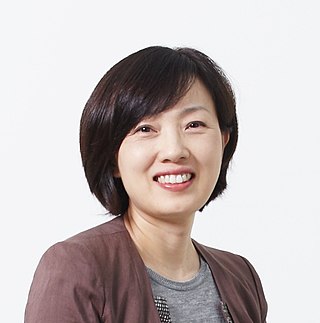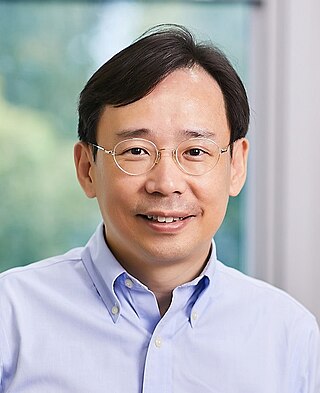
South Korea competed as Korea at the 1996 Summer Olympics in Atlanta, United States. 300 competitors, 189 men and 111 women, took part in 160 events in 25 sports.

Empress Myeongseong is a 2001 and 2002 South Korean television series that aired on KBS2.

The South Korea men's national volleyball team represents South Korea in international volleyball competitions and friendly matches, governed by Korea Volleyball Association. The Republic of Korea (ROK) has competed in the Olympic Games eight times, but has not featured since the 2000 Olympic Games in Sydney, Australia. The national team's best performance at the Olympic Games was 5th place at the 1984 Games in Los Angeles, California, United States. The national team at the FIVB World Championship competed nine times, with their best result at 4th place in 1978. On continental level, The national team won three gold medals at the Asian Games in 1978, 2002 and 2006. And at the Asian Championship, the national team won four gold medals, two of these was at home in 1989 Seoul and 2001 Changwon and the other two are in 1993 and 2003. The national team now ranks 28th in the FIVB World Rankings.
Christopher J. Chang is an American chemist and the Edward and Virginia Taylor Professor of Bioorganic Chemistry at Princeton University. Previously, he was a professor of chemistry and of molecular and cell biology at the University of California, Berkeley, where he holds the Class of 1942 Chair. Chang is also a member of the Helen Wills Neuroscience Institute, a Howard Hughes Medical Institute investigator, adjunct professor of pharmaceutical chemistry at the University of California, San Francisco, and faculty scientist at the chemical sciences division of Lawrence Berkeley Lab. He is the recipient of several awards for his research in bioinorganic chemistry, molecular and chemical biology.

V. Narry Kim is a South Korean biochemist and microbiologist, best known for her work on microRNA biogenesis. Her pioneering studies have laid the groundwork for the biology of microRNA and contributed to the improvement of RNA interference technologies.

Ryoo Ryong FRSC is a distinguished professor of chemistry at KAIST in Daejeon, South Korea. He was the head of the Center for Nanomaterials and Chemical Reactions, an Extramural Research Center of the Institute for Basic Science. Ryoo has won a variety of awards, including the Top Scientist and Technologist Award of Korea given by the South Korean government in 2005. He obtained the KOSEF Science and Technology Award in 2001 for his work on the synthesis and crystal structure of mesoporous silica.

Kim Kimoon is a South Korean chemist and professor in the Department of Chemistry at Pohang University of Science and Technology (POSTECH). He is the first and current director of the Center for Self-assembly and Complexity at the Institute for Basic Science. Kim has authored or coauthored 300 papers which have been cited more than 30,000 times and he holds a number of patents. His work has been published in Nature, Nature Chemistry, Angewandte Chemie, and JACS, among others. He has been a Clarivate Analytics Highly Cited Researcher in the field of chemistry in 2014, 2015, 2016.

Cheon Jinwoo is the H.G. Underwood Professor at Yonsei University and the Founding Director of the Center for Nanomedicine, Institute for Basic Science (IBS). As a leading chemist in inorganic materials chemistry and nanomedicine Cheon and his research group mainly focus on developing chemical principles for synthesizing complex inorganic materials and nanoprobes/actuators used in imaging and controlling of cellular functions within the deep tissue in living systems.

Lee Young-hee is a South Korean physicist. He is a distinguished professor in physics and energy science at Sungkyunkwan University as a SKKU fellow. He is also director of the Center for Integrated Nanostructure Physics in the Institute for Basic Science (IBS). He has been a Clarivate Analytics Highly Cited Researcher in the cross-field category in 2018–2023.

Cheo Yong is a South Korean television series starring Oh Ji-ho, Oh Ji-eun and Jun Hyo-seong. The first season aired on cable channel OCN from February 9 to April 6, 2014, for 10 episodes.

Kwang Soo Kim is a South Korean professor of chemistry, an adjunct professor in physics, and the director of Center for Superfunctional Materials (CSM), of Ulsan National Institute of Science and Technology (UNIST) in South Korea.

Flowers of the Prison is a 2016 South Korean drama television series starring Jin Se-yeon, Go Soo, Kim Mi-sook, Jung Joon-ho, Park Joo-mi, Yoon Joo-hee, Kim Soo-yeon, Jun Kwang-ryul and Choi Tae-joon. It is MBC's special project drama to commemorate the network's 55th-founding anniversary. The drama also marks the 3rd time collaboration between director Lee Byung-hoon and writer Choi Wan-kyu, after Hur Jun and Sangdo. It replaced Marriage Contract and aired on MBC every Saturday and Sunday at 22:00 (KST) for 51 episodes from April 30 to November 6, 2016.

YoungSoo Kim is a South Korean chemist. Kim is an associate professor in Department of Pharmacy at Yonsei University.
Elizabeth Joy New is an Australian chemist and Professor of the School of Chemistry, University of Sydney. She won the 2018 Australian Museum 3M Eureka Prize.

Changjoon Justin Lee is an American neuroscientist specializing in the field of glioscience. He served as the Director of Center for Neuroscience at the Korea Institute of Science and Technology and later founded the WCI Center for Functional Connectomics as part of the World Class Institute Program. In 2015, he established the Center for Glia-Neuron Interaction before becoming co-director of the IBS Center for Cognition and Sociality and head of the Cognitive Glioscience Group in 2018. He has been on the editorial boards of the journals Molecular Brain and Molecular Pain and is a chief editor of Experimental Neurobiology.

Eui-Cheol Shin is a South Korean medical immunologist, academic, and author. He is a professor at the Graduate School of Medical Science and Engineering at the Korea Advanced Institute of Science and Technology (KAIST), and director of The Center for Viral Immunology at the Institute for Basic Science (IBS), a Korean government-funded research institute.














